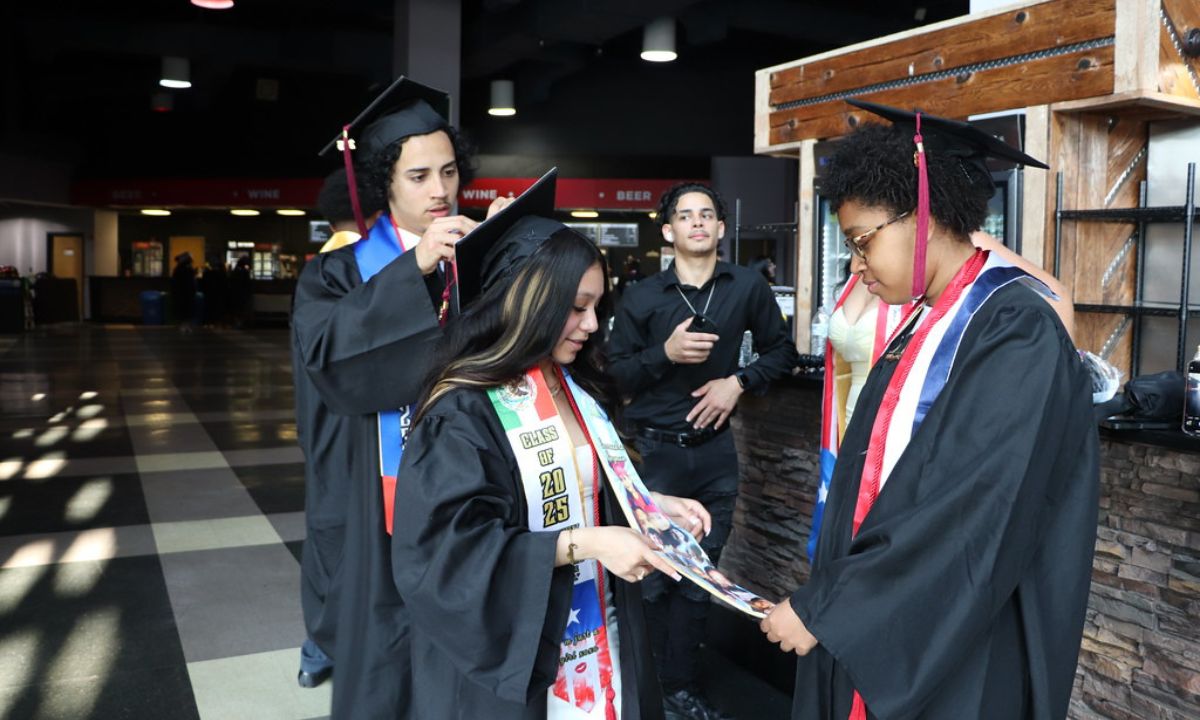K-12 Education Alone Can’t Disrupt the Poverty Cycle. My School Is Fixing That
Bonilla-Santiago: Students at my New Jersey school start prepping for college in K-8, earn credits in HS & get tuition assistance toward a bachelor's.

Get stories like this delivered straight to your inbox. Sign up for The 74 Newsletter
Throughout my career, I have valued higher education because it provided me with a vital safety net of security. I come from a family with an extraordinarily strong work ethic, where failure was not an option. Survival meant getting out and doing better — for myself and those around me. As a first-generation Latina graduate of both high school and college, I knew that higher education was my only way out of poverty.
The pathway to higher education brought me to Rutgers University-Camden in 1981, where I am now a professor and director of the Community Leadership Center. Enrolling there helped me build the social and political capital to establish LEAP Academy — Camden’s first charter school — in 1997. Since then, the school has grown from five trailers on an abandoned lot to a complex of transformed historic buildings along Cooper Street.
Thousands of students have passed through our doors, and we have maintained 100% high school and college graduation rates. That has been our mission for 30 years. It is an ambitious goal, especially in a city like Camden, where nearly 30% of residents live below the poverty line and the district’s high school graduation rate hovers around 65%. Many young people in the city are left without a diploma and few opportunities ahead.
I am incredibly proud of what LEAP Academy has achieved for Camden’s students, families and educators. But K-12 education alone is not enough. Real generational change — especially for Black and Hispanic students — comes from obtaining a college degree and the financial support necessary to make that possible.
While a strong K-12 education provides essential groundwork, access to quality post-secondary education, career training and a broader approach to addressing systemic inequalities are all necessary to truly break the cycle of poverty.
This past June, I watched 160 students — all Black or Hispanic, many first-generation college-goers — walk across LEAP’s graduation stage. Each one took a step toward a degree, a career and a brighter future. For them, college is more than an academic achievement, it is a generational breakthrough.
So how does LEAP’s approach to college access work?
We set high expectations at an early age, remove financial barriers for families and challenge high school seniors to complete a full schedule of college courses.
At LEAP, getting ready for college starts in pre-K. With sponsorship from Rutgers University, young children can attend an early learning program that continues into LEAP’s K-12 school. Parents volunteer 40 hours each year, helping to make the school stronger for everyone. Even in the early grades, students at LEAP spend 10 more days in school than those attending neighboring public schools. We also serve as a community hub, opening our buildings at 7:15 a.m. for breakfast and keeping them open until 6:15 p.m. to provide students with additional instruction, tutoring, extracurricular clubs and intramural sports.
Each of our five buildings has a College Access Center. For students in K-8, center staffers monitor their grades, explain how their academic progress connects to college readiness and update parents on how their children’s performance stacks up to college-ready skills. These services intensify in high school, as students prepare to apply to college. In addition, the team presents programs that introduce students to career possibilities in areas such as STEM, law, architecture, business and writing — all fields that can be pursued through college study.
In high school, students take real college classes taught by professors at Rutgers and Rowan universities. This helps these inner-city students build strong skills and feel more confident about life after high school. Graduate students from Rutgers-Camden, tutor LEAP students during the school day and after school when needed, for example, in tough classes like statistics.
Over 1,200 LEAP students have graduated with a full year of college credits, positioning them to finish college in three years and saving on tuition costs for families.
In addition, LEAP pays full tuition through the Alfredo and Gloria Bonilla-Santiago Endowed Scholarship for graduates who maintain a 3.5 GPA during their time at LEAP, have four or fewer unexcused absences during the year and need financial aid. Hundreds of students who maintain a 3.0 GPA at Rutgers University’s three campuses receive full tuition.
An added benefit: As our students achieve college success, Camden receives a surge of intellectual capital.
Without an educated workforce, sustainable economic investment is unlikely. Companies will invest only if they believe they can find prepared, local talent. A city filled with college-educated citizens is not a dream — it is an economic imperative.
Today, Camden’s workforce is expanding, and residents are actively working to revitalize the city. From growing waterfront businesses to local hospitals and universities, LEAP graduates are shaping the city’s future while delivering valuable services to the broader community and helping to renew civic pride.
Yet troubling trends are emerging. Across the country, skepticism about the value of college is growing. One survey found that only 36% of adults have confidence in higher education. Another showed that just 25% believe earning a bachelor’s degree is important for getting a good-paying job.
This level of doubt is both misguided and dangerous. While some companies have removed degree requirements from job postings to demonstrate skills-based hiring, having a degree is still a criterion that managers use to determine whether a candidate brings the right skills to the table. College isn’t just about skills — it’s about learning to think critically, collaborate effectively and broaden perspectives. It’s where students meet peers from different backgrounds, build lasting relationships and expand their world views. Hiring managers compare job candidates against one another, and having a college degree weighs in favor of applicants who’ve earned one.
Undervaluing higher education risks breaking the very link that lifts up both students and cities. Disrupting the cycle of poverty requires year-round work and unwavering dedication. It takes educators who believe in their students, families who stay engaged and communities willing to invest.
Parents, educators and policymakers invested in K-12 education must never lose sight of what truly matters when transforming urban communities: helping every student envision a future beyond high school, and equipping them with the tools to reach it.
Get stories like these delivered straight to your inbox. Sign up for The 74 Newsletter

;)
